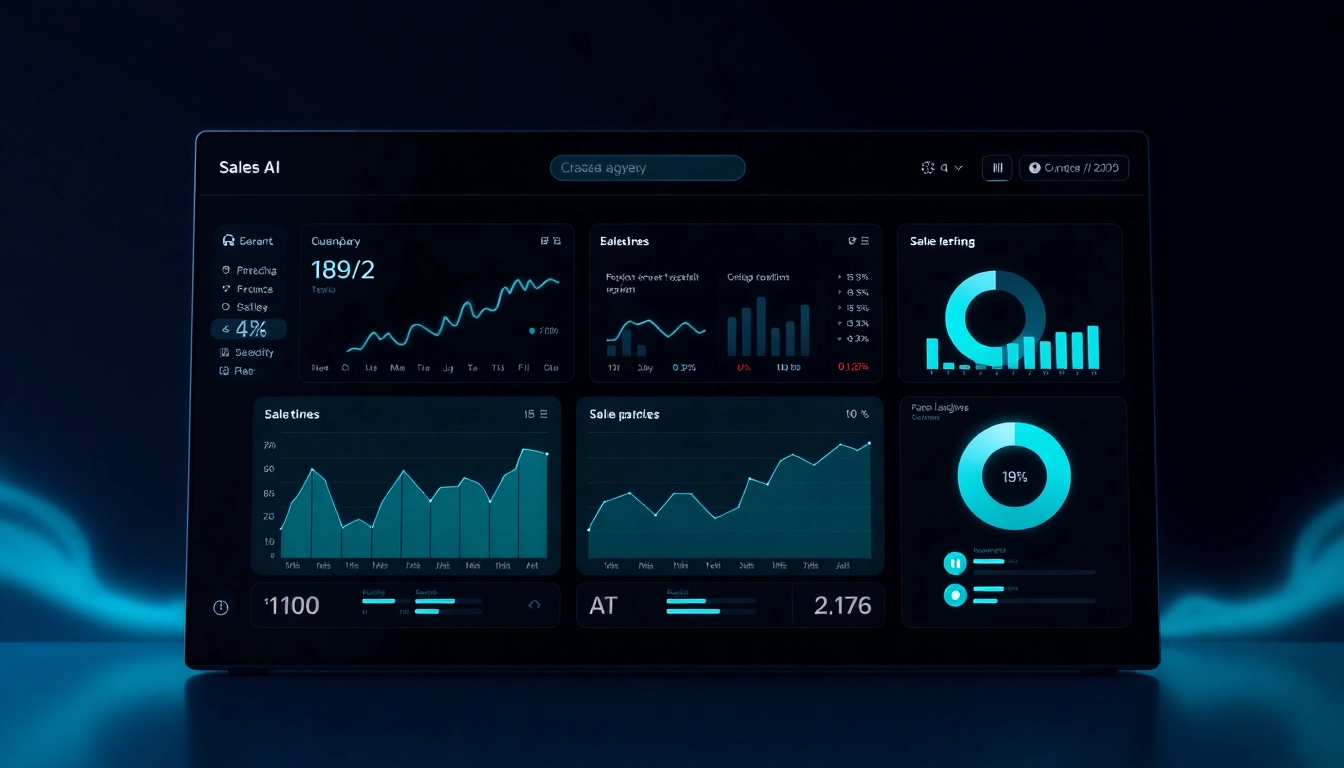Understanding Sales AI: The Future of Selling
As business landscapes rapidly evolve, the integration of technology into every facet of commercial operations becomes not only advantageous but essential. Sales AI has emerged as a transformative force within the sales domain, offering innovative solutions that enhance efficiency, drive greater revenue, and improve customer interactions. This article delves into the realms of Sales AI, exploring its definition, benefits, and impact on the sales process.
What is Sales AI?
Sales AI refers to the application of artificial intelligence tools and technologies in the sales process, incorporating machine learning, natural language processing, and data analytics to optimize sales workflows. By harnessing vast amounts of data, Sales AI solutions automate mundane tasks, deliver personalized customer experiences, and uncover insights that can inform strategic decision-making. This enables sales teams to focus on what they do best—building relationships and closing deals.
Key Benefits of Implementing Sales AI
- Enhanced Efficiency: AI systems automate routine tasks such as data entry, lead qualification, and follow-up scheduling, allowing sales teams to direct their efforts towards more complex activities that require human intervention.
- Improved Customer Insights: Advanced analytics capabilities provide deeper insights into customer behaviors and preferences, helping businesses to tailor their offerings and messaging accordingly.
- Increased Sales Productivity: By streamlining processes and providing actionable insights, Sales AI tools significantly boost the productivity of sales representatives, leading to improved conversion rates.
- Predictive Analytics: Sales AI employs predictive algorithms that analyze historical sales data to forecast future trends, empowering sales teams to target their efforts more effectively.
- Cost Reduction: Automation through Sales AI leads to reduced operational costs, which is critical for businesses looking to optimize their performance in a competitive environment.
How Sales AI Enhances Customer Interactions
The customer experience journey has evolved, and Sales AI plays a pivotal role in shaping it. AI tools facilitate personalized communication, understanding customer needs, and predictive lead scoring, which helps sales teams prioritize outreach. For instance, AI-driven chatbots provide instant support, answering customer inquiries in real-time and gathering essential information that can be fed back into the sales process.
Integrating Sales AI into Your Business Strategy
Steps to Implement Sales AI Tools
The implementation of Sales AI can seem daunting, but breaking it down into manageable steps makes the process more approachable and effective. Here are essential steps to consider:
- Assess Your Current Sales Process: Conduct a thorough analysis of existing workflows to identify inefficiencies and opportunities for automation.
- Set Clear Objectives: Define specific goals for your Sales AI implementation, such as reduced response times or higher lead conversion rates.
- Choose the Right Tools: Research various Sales AI solutions, evaluate their features, and select the ones that best align with your business objectives and existing technology stack.
- Train Your Team: Provide comprehensive training to ensure that your sales representatives fully understand the technology and can leverage it effectively.
- Monitor and Adjust: Continuously track the performance of the Sales AI tools and make adjustments based on real-world feedback and metrics.
Measuring the Impact of Sales AI on Your Sales Process
To truly understand the benefits of Sales AI, businesses must measure its impact on the sales process. Key performance indicators (KPIs) that should be monitored include:
- Lead Conversion Rate: Track how Sales AI affects the percentage of leads that are converted into customers.
- Sales Cycle Length: Analyze whether the introduction of AI has led to a shorter sales cycle.
- Customer Satisfaction Scores: Measure customer feedback and satisfaction levels pre- and post-implementation of Sales AI.
- Return on Investment (ROI): Calculate the revenue generated as a direct result of using Sales AI against the costs of the AI tools.
Case Studies: Successful Sales AI Adoption
Real-world examples can illuminate the tangible benefits of Sales AI. For instance, Company X implemented a Sales AI platform to automate their lead generation process. The result? A 40% increase in qualified leads and a 25% jump in overall sales within six months. Similarly, Company Y utilized predictive analytics to refine their targeting strategies, leading to a doubling of their conversion rates within the first year of deployment.
Choosing the Right Sales AI Tools for Your Business
Comparing Popular Sales AI Solutions
The market is filled with various Sales AI tools, each with its unique features and benefits. Here are some noteworthy options to consider:
- Salesforce Einstein: An AI-driven analytics tool integrated with Salesforce CRM, providing predictive insights and offering automation for sales processes.
- HubSpot Sales: With AI features that assist in lead scoring and automation of various marketing and tracking processes, HubSpot is versatile and user-friendly.
- PandaDoc: Focused on document management, PandaDoc employs AI to personalize proposals based on client data, enhancing engagement and approval rates.
- Clari: A revenue operations platform that leverages AI to analyze and predict revenue performance through the entire sales pipeline.
Factors to Consider When Selecting Sales AI Software
When selecting a Sales AI tool, it’s crucial to consider several key factors:
- Integration: Ensure that the AI tool can seamlessly integrate with existing systems, such as your CRM and marketing platforms.
- User Interface: A user-friendly interface will encourage adoption among your sales team and facilitate smoother implementation.
- Customization: Look for solutions that allow for customization to fit your unique sales processes and team structures.
- Scalability: Choose tools that can grow along with your business and adapt to future needs.
- Support and Training: Opt for vendors that offer robust customer support and training resources to help your team maximize the tool’s potential.
Future Trends in Sales AI Technology
The landscape of Sales AI is continuously evolving. Future trends that are beginning to shape the industry include:
- Increased Personalization: Expect advanced AI algorithms to deliver even more personalized customer interactions based on real-time data.
- Voice AI Technology: The incorporation of voice recognition and processing capabilities will create new interfaces for sales interactions.
- AI Ethics and Compliance: As data privacy concerns grow, businesses will need to adopt ethical AI practices while complying with regulations.
- Integration of Augmented Reality (AR) and Virtual Reality (VR): These technologies may eventually blend with Sales AI to enhance product demonstrations.
- Greater Emphasis on AI-driven Insights: Businesses will utilize AI to provide deeper insights into market trends, customer sentiment, and sales performance.
Overcoming Challenges in Sales AI Adoption
Common Misconceptions About Sales AI
Despite the evident benefits, misconceptions about Sales AI can hinder its adoption.
- AI Replaces Human Jobs: Many believe AI will replace human sales teams, but the reality is that it supports and enhances their capabilities.
- AI is Only for Large Companies: While large enterprises may have the resources, there are scalable AI solutions designed for small to medium-sized businesses.
- AI Requires Extensive Data: While AI thrives on data, many entry-level applications can start delivering value with limited datasets.
Addressing Data Privacy Concerns
Data privacy is paramount in the age of AI. Businesses must ensure compliance with data protection regulations, such as GDPR or CCPA. This entails:
- Implementing strict data governance policies.
- Utilizing data anonymization techniques.
- Conducting regular audits of data management practices to guarantee compliance.
Training Your Team to Use Sales AI Effectively
The success of Sales AI adoption greatly depends on the team’s ability to leverage the new technology. Here are strategies to ensure effective training:
- Develop Comprehensive Training Programs: Tailor programs to cover both the technical aspects of the AI tools and their implications on the sales workflow.
- Encourage a Culture of Learning: Foster an environment where team members feel encouraged to explore and understand the technology further.
- Provide Continuous Support: Offer ongoing assistance as team members navigate challenges and continue to utilize the tools over time.
Maximizing the Benefits of Sales AI
Integrating Sales AI with Existing Processes
The successful integration of Sales AI into existing workflows requires careful planning and execution. This may involve modifying current processes to better utilize the AI tools, ensuring alignment among teams, and fostering collaboration between sales and IT departments to facilitate a smooth transition. By focusing on integration, companies can create a cohesive operational strategy that leverages Sales AI’s capabilities effectively.
Ongoing Evaluation and Adjustment of Sales AI Tools
Sales AI is not a “set it and forget it” solution. Continuous evaluation of the tools ensures they remain relevant and effective. Regularly assess performance against defined KPIs, solicit feedback from users, and adapt based on market changes or technology advancements. Iterative improvement will drive sustained value from your AI investments.
Staying Ahead in the Competitive Sales Landscape
With the sales landscape constantly evolving, staying ahead is crucial for retaining a competitive edge. By embracing Sales AI, businesses can not only meet current market demands but also anticipate future trends. Strategic investments in AI technology, coupled with a commitment to continuous learning and adaptation, will position organizations to thrive in an increasingly data-driven world.



